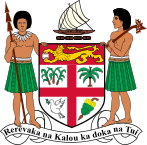Message from Curriculum Development Unit
Director for Curriculum Development Unit
The Ministry of Education is currently undergoing through a transitional period of changes and reforms to achieve the government’s vision of improving the quality of education in Fiji and making Fiji a knowledge-based society. The Curriculum Development and Advisory Unit (CDAU) plays a pivotal role in this national aspiration by reviewing, designing, implementing, strengthening and supporting the national school curriculum so that it provides the competencies necessary for lifelong learning and the competencies needed for holistic development. The Ministry has also endorsed international, regional and national policy documents to enhance and stimulate sustainable curriculum development in education. CDAU has aligned itself to these policy documents to ensure our education system is on par with countries that have advanced education programmes. The current global world presents a vast array of challenges for our children and young people that are different from those faced by previous generations and thus there is a need for continuous research into exploring a national curriculum that is bound to guarantee quality, relevance, effectiveness and efficiency of our education system over time regardless of whatever challenges we face. Global efforts to minimise threats to economic stability, environmental damage, and a growing number of social issues present clear signs that current global trends need to be addressed in the current curriculum reforms. In doing so, Fiji being a small developing nation, does share the same curriculum challenges that developed countries experience. A way to overcome this is through ‘reorienting education systems to sustainability’. This focuses on achieving a culture of sustainability in which teaching and learning for sustainability are reinforced by continuous improvement through the sustainable methods of curriculum development, implementation and management. This will ensure a well-balanced education system for all our upcoming generations so that they can live on to fulfill their dreams and continue to contribute positively to building our nation.
Under the policy documents within the Ministry of Education, the CDAU section has introduced an outcomes-based curriculum which is child-centered and child friendly. The Fiji National Curriculum Framework (NCF) aims to:
- ensure acquisition and development of knowledge, skills and values, and of the associated capabilities and competencies that would enable all young Fijians to lead meaningful and productive lives;
- guide teachers on what is to be taught across the years of schooling at all levels from Early Childhood to Year 13 and what is expected of students each year;
- guide students about what they have learned, where they need to progress to and how well they have achieved;
- ensure that quality learning and teaching is carried out;
- make learning relevant and interesting to students.
The NCF promotes a few important philosophies about teaching and learning to provide teachers with more confidence to handle the curriculum documents available to them and to deliver the curriculum to the best of their abilities while observing the following:
- there is flexibility for teachers to develop teaching and learning programs and the strategies that they will use;
- to take into account the different rates at which students develop;
- the diverse range of learning needs in the class;
- schools and teachers will continue to apply their professional judgement about how to best reflect local and regional contexts to their learning environment.
CDAU further supports the above curriculum implementation processes through the production, printing and supply of textbooks and other relevant resources for all year levels and subjects to assist in the learning and teaching in the classroom. The section is also responsible for assessing learning through the moderation of internal assessments, setting of external examinations for Years 8, 12 & 13 and LANA for Years 5 & 7.
We highly appreciate and look forward to the continued support from our stakeholders and partners as we take education to greater heights.
